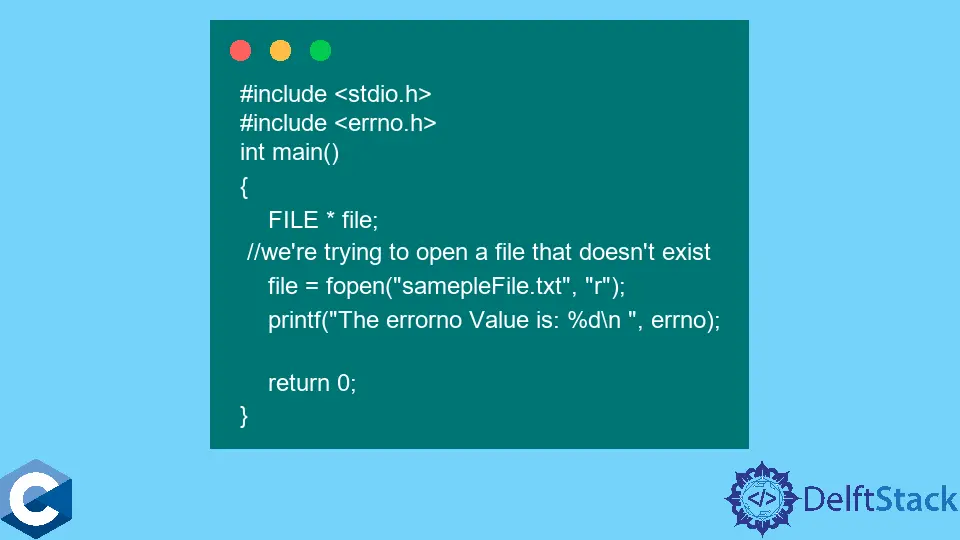How to Handling Errors in C
- Error Handling in C
-
Use Global Variable
errno -
Use
perror()andstrerror()Functions -
Use
EXIT_STATUS - Conclusion

This brief article is about the discussion on different ways that can be used to handle Errors in C language programs.
Error Handling in C
Although error handling (or exception handling) is not directly supported by C, there are still ways to handle errors in the language. A programmer must test function return values and attempt to prevent errors from occurring in the first place.
A quick test on these return values can be done quickly. For example, an if statement because many C function calls return a -1 or NULL in case of an error.
Different methods can be used to handle different types of errors in C language. Some of them are discussed in this article.
- Use the global variable
errno. - Using
perror()andstrerror() functions by C language. - Use the Exit status of the function.
Use Global Variable errno
A global variable errno is defined in the library file errorno.h. In the C programming language, a variable called errno is automatically given a code (value) that can be used to specify the error that occurred.
Error types are indicated by different codes (values) for errno. Here’s a list of a few different errno values and their explanations.
| Error Code | Description |
|---|---|
| 1 | This operation is not allowed. |
| 2 | File or directory is not found. |
| 3 | Function not found. |
| 4 | Any system call interrupted. |
| 5 | Input or output error. |
| 6 | No such device found. |
| 7 | Arguments list passed is longer than specified. |
| 8 | Exec function error. |
| 9 | Bad file number error. |
| 10 | Chile process not found. |
| 11 | Try it again. |
| 12 | Memory shortage error. |
| 13 | Access permission is denied. |
Let’s consider an example code segment in which we will try to open a file that doesn’t exist. Then we will see the value of the errno variable.
Code Example:
#include <errno.h>
#include <stdio.h>
int main() {
FILE* file;
// we're trying to open a file that doesn't exist
file = fopen("samepleFile.txt", "r");
printf("The errorno Value is: %d\n ", errno);
return 0;
}
In the code example above, we created an object for File and then called the fopen() function so that it could open a file for reading. But we have given a file name not found in the directory.
So it will create an error, and an errno value will be set. We will then print its value.
Output:

From the output, the error number returned is 2. It can be matched from the table above that 2 means "no such file or directory was found".
Use perror() and strerror() Functions
The error types encountered are indicated by the errno value obtained above.
If the error description is necessary, two functions can be used to display a text message linked to the error number. These are perror() and strerror().
-
The
perror()function displays the user-defined text message for the error, followed by the actual message set for thaterrno.Syntax:
void perror(const char *str)The
stris the string for the custom message that you need to display before the actual error message. -
The
strerrorreturns the textual message set for theerrnopassed to it.Syntax:
char *strerror(int errnum)The
errnumis the error no that is passed to it.
We will modify the previous example for opening a non-existing file and display the error messages through perror() and strerror().
Code Example:
#include <errno.h>
#include <stdio.h>
int main() {
FILE* file;
// we're trying to open a file that doesn't exist
file = fopen("samepleFile.txt", "r");
if (file == NULL) {
printf("Value of error number: %d\n", errno);
perror("Error message by perror");
printf("Error Message from strerror : %s\n", strerror(errno));
`
} else {
fclose(file);
}
return 0;
}
In the above code segment, we have printed the errno value, then the error message using perror, and then through strerror.
Output:

Use EXIT_STATUS
To indicate a successful or unsuccessful termination, the C standard specifies two constant macros: EXIT SUCCESS and EXIT FAILURE, which may be passed to exit(). These macros are those listed in stdlib.h.
We will further modify the previous example and make the failure exit call if the file is not found and a successful exit in the case file is found.
Code Example:
#include <errno.h>
#include <stdio.h>
#include <stdlib.h>
int main() {
FILE* file;
// we're trying to open a file that doesn't exist
file = fopen("samepleFile.txt", "r");
if (file == NULL) {
int errorNumber = errno;
printf("Value of error number: %d\n", errno);
perror("Error message by perror");
printf("Error Message from strerror : %s\n", strerror(errno));
exit(EXIT_FAILURE);
} else {
fclose(file);
exit(EXIT_SUCCESS);
}
printf("Program exiting");
return 0;
}
In the code example above, we have included the exit function in both cases of the conditional statement. We have added a printf function just before the program exits.
This message will not be printed as the program would be exited before.
Output:

Conclusion
C does not have explicit support for exception handling. However, we can use certain error-handling primitives (i.e., library functions) to achieve sufficient exception handling in C.